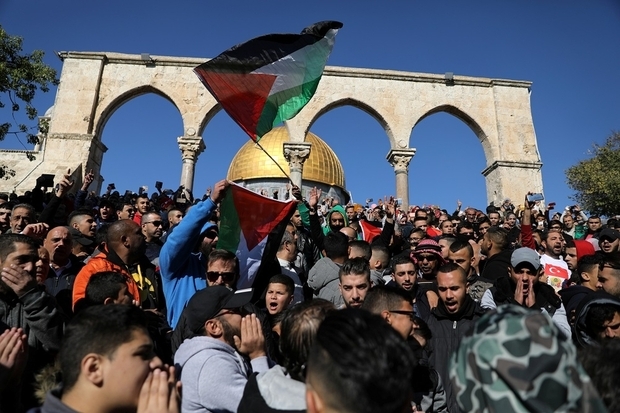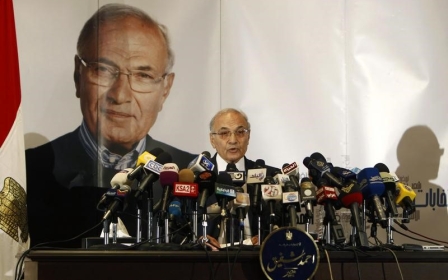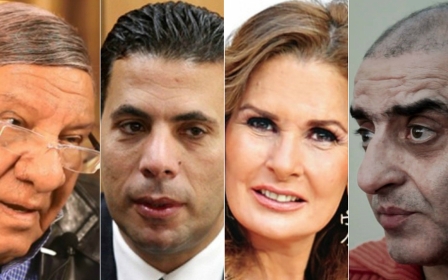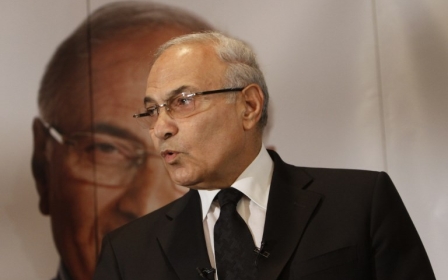Egypt launches criminal probe into New York Times leaks

Egypt has launched a criminal investigation into a New York Times report claiming that Cairo sought to influence public opinion into accepting US President Donald Trump's recognition of Jerusalem as the capital of Israel.
The article "undermines Egypt's security and public peace, and harms the country's public interest", general prosecutor Nabil Sadek said in a statement, while Egyptian parliamentary speaker Ali Abdel Aal said the article proved that the New York Times was allied with the Qatar and the Muslim Brotherhood, local media reported.
The investigation comes after a wave of commentary from MPs and pro-government media denouncing the 6 January article as part of an international conspiracy against Egypt.
Egyptian MP Mostafa el-Gendy accused the newspaper of being "at war with Egypt" and trying to "bring down the nation, not just the state or the president", wrote the New York Times.
Pro-government television anchors reportedly called on the Times to answer how the recordings ended up with the paper, suggesting that the newspaper was secretly allied with the Brotherhood and Qatar, according to the report.
Egypt is one of four Arab nations that imposed a punishing boycott on Qatar last June, accusing it of financing terrorism and sheltering Brotherhood leaders.
Officially, Egypt supports a future Palestinian state with East Jerusalem as its capital.
But according to the report Egypt quietly agreed to Trump's decision last month to recognise Jerusalem as the Israeli capital and to move the US embassy there.
The audio leaks reveal how four Egyptian television and film personalities have allegedly been directed by Egypt's secret service to publicly back Donald Trump's decision to recognise Jerusalem as Israel's capital.
Cairo denials
In four phone conversations, a man named by the New York Times as Captain Ashraf al-Kholi told talk-show hosts Mofid Fawzy, Saeed Hassaseen and Azmi Megahed and actress Yousra that while the Egyptian state wanted highly influential people like them to help convince Egyptians Trump's plan was in their country's interests.
After the article was published, Egypt's State Information Service (SIS) said in a statement that no one by the name of Ashraf al-Kholi worked for the intelligence service and denied the accuracy of the Times report.
The statement added that two of the people mentioned by the report as TV talk show hosts - Mofid Fawzy and Saeed Hassaseen – had actually stopped presenting television shows.
Initially, one of the hosts, Azmi Megahed, confirmed the authenticity of the recording, and described the intelligence officer as a long-time acquaintance. But Megahed later retracted that statement, and in an Egyptian television interview claimed the Times had misquoted him.
Responding to the claims, the Times's international editor, Michael Slackman, said: "Our story was a deeply reported, consequential piece of journalism, and we stand fully behind it."
"We disclosed in the original report that the audio recordings were provided to the Times by an intermediary supportive of the Palestinian cause, but we had no agenda other than giving our readers the facts they needed to know."
The Egyptian government announced on Monday that the first round of presidential elections would take place on 26 March.
Egyptian President Abdel Fatah al-Sisi, who is expected to run for re-election, faces little opposition since his principal opponent, former prime minister Ahmed Shafik pulled of the race.
New wave of leaks
In a series of new leaks published on Wednesday by the Istanbul-based Mukamleen satellite channel, intelligence officer Kholi is heard telling TV host Azmi Megahed to launch a smear campaign against Qatar and its ruler Sheikh Tamim bin Hamad al-Thani.
"What's important is the Arab League. You saw how they left Tamim alone. When you speak about the Arab League next, I want you to humiliate Tamim and Mozza," Kholi is heard telling Megahed in one audio recording.
Kholi is referring to the absence of several important Gulf leaders during the 13 December Arab League meeting on Jerusalem, namely UAE ruler Shiekh Khalifa bin Zayed al-Nahyan and Saudi King Salman bin Abdel Aziz.
"We want Tamim to get angry at them [Arab leaders who did not attend the meeting]. This really annoys them [Doha]," added Kholi.
Responding to Kholi, Megahed is heard saying: "Don't worry. This is the norm for me. I want you to watch today's show. I'm going to destroy them completely."
They don't respect him. They sent representatives instead of themselves. Don't worry. I'll work wonders today."
In another audio recording, Kholi is heard zoning in on Kuwait and asking Megahed criticise Kuwait for supporting Qatar.
Despite the ongoing diplomatic crisis and ensuing blockade on Doha after Saudi Arabia, Egypt, Bahrain, and the United Arab Emirates accused Qatar of sponsoring terrorism in June 2017, Kuwait has continued to mediate between the two parties.
"Have you seen the video of that Kuwaiti guy beating up that young Egyptian? I want your team to air that video and I want you to focus on this incident," Kholi is heard saying.
"We've seen Kuwait's [supportive] role with Qatar, so we have to capitalise on this incident. You can use this incident to say that if Kuwait let's go of its position [mediating between both sides], then we can go back to being friends. If not, then..."
Responding to Kholi, Megahed is heard saying: "How could they [Kuwait] forget what we did with them in the 1990s during the war with Saddam. If they've forgotten, then they are worthless people."
Kholi reaffirms his point again: "Well you know how the Gulf countries are like. You have to deal with them with a carrot and stick. We need to sow the seeds of partition between Qatar and Kuwait. Ill follow you today. As I told you focus on Qatar the Arab League."
New MEE newsletter: Jerusalem Dispatch
Sign up to get the latest insights and analysis on Israel-Palestine, alongside Turkey Unpacked and other MEE newsletters
Middle East Eye delivers independent and unrivalled coverage and analysis of the Middle East, North Africa and beyond. To learn more about republishing this content and the associated fees, please fill out this form. More about MEE can be found here.




